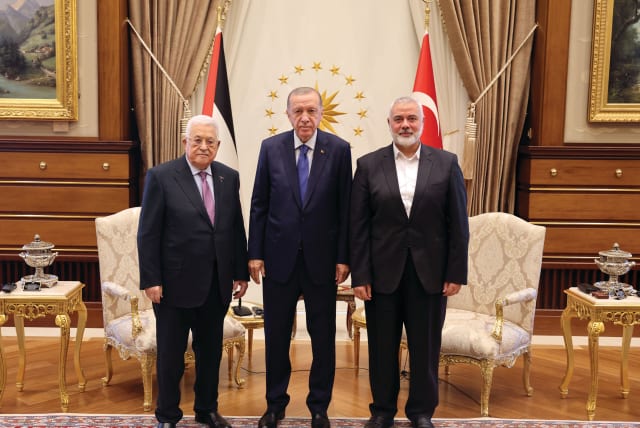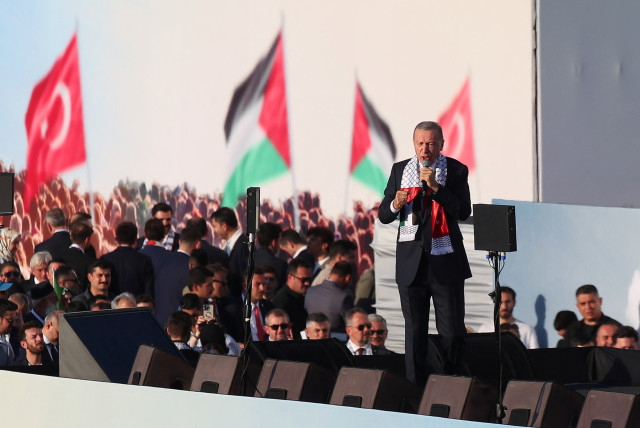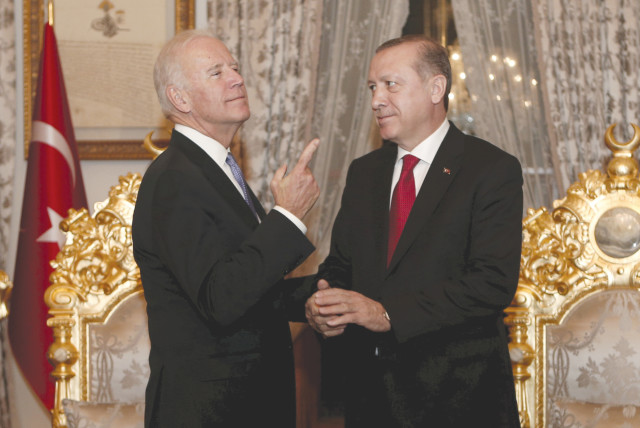Turkey attempts diplomatic balancing act with Hamas meeting - opinion

Meetings between Hamas members and Erdogan come ahead of upcoming Washington visit; what is the Turkish leader attempting?
Turkish President Recep Tayyip Erdoğan’s recent meeting with a Hamas leader in Istanbul is an attempt to show his country as a mediator in the war in Gaza, analysts told The Media Line.
Aydin Sezer, an Ankara-based foreign policy analyst, told The Media Line that Erdoğan is attempting to show that Turkey can have a role in talks between Hamas and the West as a way to appeal to his conservative base.
While Sezer believes that Erdoğan could have some influence over Hamas, it would be limited.
Turkey could have some, but limited, influence over Hamas
“Erdoğan is trying to control the Islamic sectors at home while at the same time trying to improve his relations with the West,” Sezer said.
During Saturday’s meeting in Istanbul with Hamas leader Ismail Haniyeh, Erdoğan spoke about delivering aid to Gaza, according to the Reuters news agency.
Days before the meeting, Haniyeh met with Turkish Foreign Minister Hakan Fidan in Doha.
Sezer said the Turkish president would especially want to appeal to his base now because of his Justice and Development Party (AKP) suffering political defeats in local elections last month, including in Turkey’s two largest cities, as well as areas traditionally held by the AKP.
A little over a week after the local elections, Turkey announced export restrictions to Israel.
Sezer said that Erdoğan believed those losses were partly due to Turkey’s continued trade with Israel at the same time as large domestic protests against Israel.
Sezer said those sentiments partly pushed Erdoğan away from the more moderate tone he tried to strike earlier in the war, such as his comments after October 7, which emphasized calming tensions and stating that civilian casualties were unacceptable.
The state news agency reported four days after October 7 that Erdoğan stated that any action against civilians was unjustified.
Before the Israel-Hamas conflict, Turkish-Israeli ties were strongly improving. Israeli President Isaac Herzog visited Ankara in 2022, and Erdoğan met with Israeli Prime Minister Benjamin Netanyahu on the sidelines of a UN General Assembly meeting in 2023.
Ӧzgür Ünlühisarcıklı, the German Marshall Fund’s Ankara office director, told The Media Line that the Turkish president met with the Hamas leader to try to play a greater role in talks on the war in Gaza.
“He wants to stay in the game, that is important for him. Turkey is an important regional actor and cannot be a bystander in important developments in the region,” he said.
Ünlühisarcıklı added that Ankara could play a larger role once hostilities end, such as with the reconstruction of Gaza and providing security.
Erdogan: self-proclaimed Palestinian defender
“Turkey is better positioned than Egypt or Qatar to play the role,” he said.
The meeting could also appeal to Turkey’s conservatives if they believe it is in the interests of Palestinians.
For years, Erdoğan has tried to cultivate an image as a defender of Palestinians and as a leader of Muslims worldwide.
On Sunday, Foreign Minister Fidan called on the international community to recognize a Palestinian state.
“The strongest response to Israel and the path to victory lie in unity and integrity,” Erdoğan said, according to a Turkish presidency’s statement after his meeting with Haniyeh.
However, Erdoğan also needs to maintain ties with the West, especially due to Turkey’s struggling finances, according to Ünlühisarcıklı. The country’s economic strain had forced it to make an effort to improve relations with former rivals, including Israel, before the war in Gaza.
Relations with the West may get a boost next month when Erdoğan visits US President Joe Biden in Washington on May 9.
Ünlühisarcıklı said that along with the war in Gaza, the war in Ukraine, and tensions between Iran and Israel made the meeting necessary.
News of the meeting came after Turkey ratified Sweden's bid to enter NATO in January, a decision Ankara had delayed for more than a year and a half.
Washington, in turn, approved the sale of F-16 fighter jets to Turkey, a crucial move for the country’s aging air force, especially after being kicked out of the US’s F-35 fighter jet program following Ankara’s purchase of Russ
Jerusalem Post Store
`; document.getElementById("linkPremium").innerHTML = cont; var divWithLink = document.getElementById("premium-link"); if (divWithLink !== null && divWithLink !== 'undefined') { divWithLink.style.border = "solid 1px #cb0f3e"; divWithLink.style.textAlign = "center"; divWithLink.style.marginBottom = "15px"; divWithLink.style.marginTop = "15px"; divWithLink.style.width = "100%"; divWithLink.style.backgroundColor = "#122952"; divWithLink.style.color = "#ffffff"; divWithLink.style.lineHeight = "1.5"; } } (function (v, i) { });


